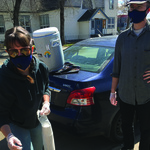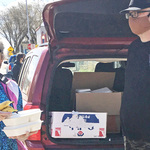St. Faith’s ministry of creating community through the sharing of food has undergone radical change since the implementation of social restrictions due to COVID-19. Before the pandemic, PrayerWorks Community Meals Program served approximately 300 meals each week in the church hall, where people sat down together for Thursday lunch, Friday dinner or Saturday breakfast. Now, the number of meals has tripled. Teams of volunteers, following strict rules about hygiene and physical distancing, prepare and package about 225 mid-day meals, four days a week. Lunches are packed each morning, Wednesday through Saturday, all in compostable containers and cups, and by 11:30 am, distribution begins. The PrayerWorks team has given this rapidly evolving ministry a new name: “Daily Bread.”
The title “Daily Bread” holds an obvious reference to the Lord’s Prayer, in which Jesus taught us to ask the Father to ‘give us this day our daily bread.’ Yet there are layers of meaning. The Ven. Travis Enright, St. Faith’s rector and head of the Daily Bread team, sees a connection to the metaphor for God’s grace in Matthew 20. That is the gospel story in which all who worked in the vineyard received the same wage, whether they came early or late in the day. Each lunch prepared by PrayerWorks, including a bun sandwich, a hot component, a snack and some vegetables, has in it at least 1,300 calories. That is enough to sustain an average person for one day in a pinch; for some it is literally their daily bread.
The lunches go to a variety of people and agencies. Early on in the COVID-19 pandemic, the Edmonton Public School Board approached St. Faith’s, asking if they could support three schools by providing 50 lunches one day each week. The Daily Bread program now provides lunches to Prince Charles Elementary School, Spruce Avenue Junior High, and Amiskwaciy Academy. St. Faith’s never knows the identity of those receiving these meals. Social workers from each school pick up and deliver the lunches to homes they have identified as needing this kind of support. The deliveries also create an opportunity for the social workers to connect with families and learn what other supports might be helpful.
Another agency that turned to St. Faith’s was the Creating Hope Society, whose mission is to support Indigenous families, particularly in maintaining family connections for Indigenous children who have been taken into care by social services. Enright values the ongoing relationship with Creating Hope as a rich opportunity for healing and reconciliation. St. Faith’s and Creating Hope had been planning a drumming workshop that would have brought together Indigenous and non-Indigenous elders to learn to drum. They even had a grant in place to fund it. Then the pandemic hit and plans have been put on hold. Instead, for the time being, Creating Hope has asked St. Faith’s to provide lunches each week for 25 Indigenous elders and to be in contact with them to make sure they are alright.
All the arrangements that have been put in place are based, according to Enright, on pre-existing relationships and trust. “We don’t see the client list,” he says, “but we are comfortable with the selection criteria to know that the people on these lists are actually in need.”
PrayerWorks volunteers distribute 70-90 Daily Bread lunches each day in the inner city around Boyle McCauley Health Centre and Boyle Street Community Centre, always maintaining safe physical distance. There, the team meets many who are vulnerable due to poverty, homelessness or insecure housing, addictions, and struggles with mental and physical health. Many of these people fall through the cracks in terms of income protections currently offered by the government. Most would not qualify because they were not employed to begin with. Some might receive AISH (Assured Income for the Severely Handicapped).
Daily Bread also provides 25 lunches each week for people identified by the John Humphrey Centre, and a further 45-50 people receive a lunch by coming to the door at St. Faith’s on a Wednesday, Thursday, Friday or Saturday. For the most part, these are the ‘regulars’ who would normally have come in for a PrayerWorks community meal before the pandemic hit. Nine lunches each week go to St. Faith’s seniors.
It is not only the number of meals and the way they are prepared that has changed at PrayerWorks. New priorities and values have emerged. The previous model of service valued efficiency; how many people could be served and how quickly. Now, safety is ‘number one’ and perhaps surprisingly, fun has become the next highest priority! Early on, Enright made clear that sharing stories and laughter should be an important part of the daily rhythm. Third is effectiveness; the team debriefs every day to see how their work could be more effective. Efficiency now comes last.
An illustration of this is the water station at Boyle Street Community Services. It might not be obvious to those who have never needed it, but Enright points out there are not many places to get free, fresh water in downtown Edmonton now that libraries, recreation centres and other public spaces are closed. So the team working at Boyle Street developed a mobile water station that can be set up each day using a portable water cooler on a box and a small wooden table. The tap on the cooler is cleaned and only one person is allowed to touch it. That person, having washed his or her hands, fills one compostable cup and puts it on the table, then they step back so the person receiving the water can pick it up while maintaining a safe physical distance. Then the next cup of water is poured, set down and picked up. One cup of water at a time, 225 times a day. It is not at all efficient, as efficiency used to be measured. But it is safe and, according to Enright, one of the most valuable services the team offers. For him, it holds a deep spiritual quality. “Are we missing communion?” Enright asks, referring to the inability of churches to gather to celebrate the Eucharist. “We have 225 communions every day.”
The Daily Bread program relies on the committed efforts of many volunteers; some who worked with PrayerWorks before the pandemic; some who are new. The Rev. Regula Brandle, for example, had been working as a hospital chaplain before COVID-19. Then hospitals started restricting visitors, including clergy. Now she leads the Boyle Street team with two or three other volunteers. She wears her clerical collar on the street, building relationships with people, talking with them, praying, ministering.
Volunteers come from a wide variety of backgrounds. Parishioners from Edmonton diocese are involved, along with others from different churches and denominations. Enright says some who come are struggling with faith, but in this work have found connections that have brought them “a fuller, richer spiritual life.”
There is some fatigue amongst volunteers, but Enright says everyone involved loves doing it. It is hard to tell them to take a break.
Volunteer Coordinator, Jennifer Stewart, is always happy to hear from people who want to help. Anyone who is interested can contact her at js.prayerworks@gmail.com. However, potential volunteers should know that anyone who comes must ‘travel light.’ Phones, coffee cups, even extra clothing have to be left in a vehicle. Once volunteers are assigned a spot, they need to stay put in a prescribed zone; no coming and going; and always adhering to hand-washing and physical distance guidelines. For those who want to contribute in other ways, it is possible to give food, if arranged in advance.
For those who are able to give money, donations are always welcome, provide the most flexibility, and can be made online at https://stfaithsanglican.org/donate.
For Enright and the PrayerWorks team, the reward for their work is often in the response they see.
“It’s so easy to take things for granted when you have a lot,” Enright says. “When you don’t and someone shows you compassion, the gratitude is incredibly authentic. Some of these people have made different choices in life than we have, but they’re still our neighbours. We don’t call them clients, we call them neighbours. But there is in that a mutuality of blessing. It’s not just us sharing because we’re stronger and they’re weak. It’s all of us sharing together.
“Who we are as church is this.”













